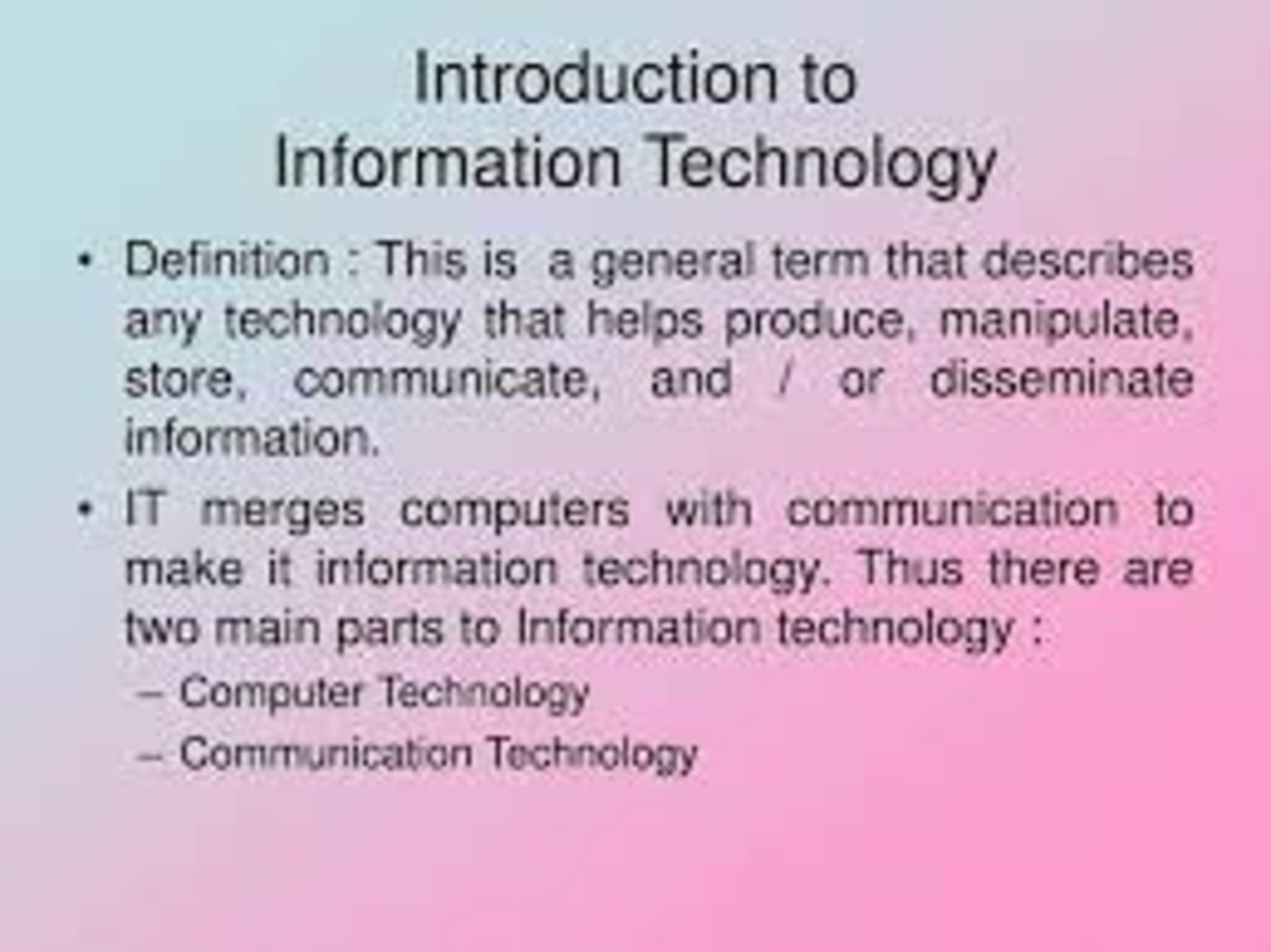Information technology plays a vital role in upscaling our professional and personal lives. From kids selling lemonade on the sidewalk to big business corporations, everyone relies on IT to grow their businesses and reach the highest potential.
Definition
Information technology is the collection of digital technologies used in the transmission, storage or manipulation of data. This includes hardware (computers, monitors, keyboards and mice), software (application programs like word processors, photo editors and web browsers) and telecommunications (internal or external networking that allows computers to share data). People who work in information technology are also responsible for developing these devices and systems, as well as the services that support them.
Information technology has revolutionized our lives and the world by allowing us to communicate with one another at unprecedented speeds, access information instantly and perform tasks that were once out of the realm of possibility. It has improved the accessibility and quality of education, allowed for greater business efficiency and even helped to create entirely new industries. Moreover, it has enhanced the defence capabilities of governments and made intelligence gathering much more efficient. These advancements have greatly changed the expectations of a society’s citizens with regard to how their governments should act and serve them. They are now expecting their government to be transparent and provide more information about various elements of its operations.
Scope
Information technology is a vast field that encompasses everything from telecomunications to methods of information retrieval and storage. It also includes computer hardware and software, networks, data management systems and more.
The scope of information technology is continually expanding as new technologies are developed. It is a critical part of modern society and is used in a variety of industries.
It is used by businesses of all sizes to automate processes, improve communication and collaboration, and manage data. It is also used to increase market reach by allowing companies to conduct business online. In addition, it is used in healthcare to manage electronic medical records and in education for distance learning.
Other fields of information technology include database management systems, data analytics, and cyber security. These areas of IT are vital to businesses, as they enable them to analyze and utilize data to make informed business decisions. These data-driven decisions help to drive revenue growth and competitive advantage. They are also essential for ensuring data integrity, security, and accessibility. IT also enables business process automation, which is important for increasing efficiency and reducing costs.
Functions
Information technology functions include data collection and storage, computer processing, information distribution, and communication. IT departments use software to centralize electronic data, automate tasks, and reduce the risk of human error. This allows businesses to streamline operations, increase productivity, and gain a competitive edge.
Another function of information technology is data analytics. This uses statistics, programming, and domain expertise to extract valuable insights from huge datasets. This analysis is then used to make informed business decisions. It is also used to identify trends and patterns in data.
Information technology also helps to lower coordination costs for firms with outside agents. For example, selling a product online rather than in a physical store significantly cuts down on the cost of customer support, staffing, shipping, inventory carrying and distribution. This is largely due to the fact that online sales can be processed by computers and require much less human intervention. The IT industry also offers a variety of services that help companies manage their IT environments and meet business needs. These include managed IT services, hardware and infrastructure management, IT service desk functions and other support activities.
Applications
Information technology provides a wealth of business benefits, including increased productivity and decision-making. The field of IT encompasses many different types of computer systems and software applications, allowing businesses to automate tasks and improve communication and collaboration. By integrating information technology into their operations, companies can improve efficiency and gain a competitive edge.
IT can also help reduce the friction between employees, customers and suppliers. For example, it can help eliminate unnecessary steps in a transactional process by asking a customer to validate existing information rather than requiring them to input it again. This reduces the amount of time customers spend waiting for answers and can increase satisfaction levels.
IT also facilitates the electronic storage of important business data and protects these records from unauthorized access. It can also allow businesses to track sales trends and provide personalized customer service. It can also simplify and streamline internal processes, allowing employees to focus on more complex, high-value projects. This allows companies to maximize revenue and grow their business. Information technology also helps individuals connect with one another and enables them to work from home or on the go.
Careers
There are a number of different careers in information technology. Some require a degree, while others can be started without one. However, a bachelor’s or master’s degree will usually give you a competitive edge and help you land the best jobs. Certifications are also available and can help you stand out from other IT professionals.
IT professionals can work in a variety of fields, including the manufacturing industry, education, and information services. They can also specialize in computer hardware, software, networking, and telecommunications. The information technology field overlaps with the computer science field, but it focuses more on the practical application of computers and other technology to make businesses function more efficiently.
IT jobs are in high demand, and the salary for an IT professional can be very good. However, the job requires an individual who is comfortable working with a wide variety of people and has strong communication skills. An IT professional should also be able to quickly adapt to changing business needs and have a strong attention to detail. CityU offers a bachelor’s degree in IT and a graduate degree in IT, cyber security, and IT management.

